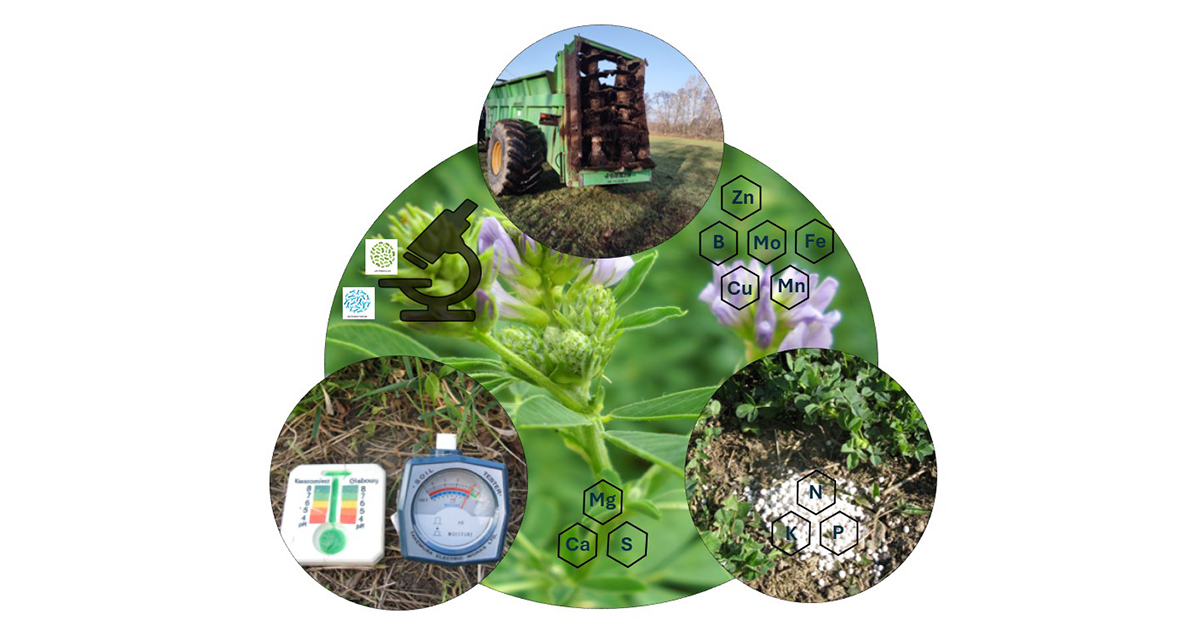Innovative Strategies for Soil Fertility, Nutrient Management, and Productivity Enhancement in Forage Crops and Grasslands
A special issue of Agriculture (ISSN 2077-0472). This special issue belongs to the section "Crop Production".
Deadline for manuscript submissions: 25 March 2026 | Viewed by 402

Special Issue Editors
Interests: grassland management practices; organic farming; forage nutritive value; fertilisation; forage conservation; meat and milk quality
Special Issues, Collections and Topics in MDPI journals
Interests: rational management on grasslands; agronomy; fertilisation; meadow and pasture communities; biodiversity
Interests: forage grasses; grasslands; fertilisation; bioactive fertilisers; Zea mays; sorghum; plant protection
Special Issues, Collections and Topics in MDPI journals
Special Issue Information
Dear Colleagues,
Demand for food is expected to grow steadily in the coming years, clearly indicating the need to increase crop yields. This goal cannot be achieved without increased fertiliser use. Modern varieties of grasses and other forage species, as a result of genetic modification, have high yield potential but also higher nutrient requirements. The global dilemma is how to increase yields while reducing the environmental pressure of NPK fertilisation.
In the face of increasing demand for high-quality fodder, it is necessary to implement innovative methods to improve soil fertility, nutrient use efficiency and biomass yields while reducing the negative environmental impact of the use of plant protection products and fertilisers.
This Special Issue of Agriculture invites submissions of original scientific articles and review papers on modern strategies to support soil fertility, crop fertilisation, optimise nutrient management, and increase the productivity of field forage and grassland crops. Papers addressing the following topics are particularly welcome:
- Sustainable fertilisation strategies for forage and grassland crops and their impact on forage quality;
- Innovative measures, fertilisers, soil improvers, soil conditioners, and microbial products to improve soil physical and chemical properties;
- Precise soil and plant nutrient management;
- Regenerative and ecological methods to improve soil health (phytosanitary conditions);
- Modern diagnostic methods for soil abundance and plant nutrient status.
By publishing your latest research results in this Special Issue, you will provide valuable insights into sustainable nutrient management, modern fertilisation systems, and soil fertility improvements in field and grassland forage production systems. We warmly invite you to submit your work!
Best regards,
Dr. Barbara Wróbel
Dr. Anna Paszkiewicz-Jasińska
Dr. Waldemar Zielewicz
Guest Editors
Manuscript Submission Information
Manuscripts should be submitted online at www.mdpi.com by registering and logging in to this website. Once you are registered, click here to go to the submission form. Manuscripts can be submitted until the deadline. All submissions that pass pre-check are peer-reviewed. Accepted papers will be published continuously in the journal (as soon as accepted) and will be listed together on the special issue website. Research articles, review articles as well as short communications are invited. For planned papers, a title and short abstract (about 250 words) can be sent to the Editorial Office for assessment.
Submitted manuscripts should not have been published previously, nor be under consideration for publication elsewhere (except conference proceedings papers). All manuscripts are thoroughly refereed through a single-blind peer-review process. A guide for authors and other relevant information for submission of manuscripts is available on the Instructions for Authors page. Agriculture is an international peer-reviewed open access semimonthly journal published by MDPI.
Please visit the Instructions for Authors page before submitting a manuscript. The Article Processing Charge (APC) for publication in this open access journal is 2600 CHF (Swiss Francs). Submitted papers should be well formatted and use good English. Authors may use MDPI's English editing service prior to publication or during author revisions.
Keywords
- biochar
- PGPR
- biofertilisers, organic and inorganic fertilisers
- macronutrient fertilisation
- micronutrient fertilization
- nitrogen fertilisation management
- sustainable fertilisation
- quality and quantity of feed
Benefits of Publishing in a Special Issue
- Ease of navigation: Grouping papers by topic helps scholars navigate broad scope journals more efficiently.
- Greater discoverability: Special Issues support the reach and impact of scientific research. Articles in Special Issues are more discoverable and cited more frequently.
- Expansion of research network: Special Issues facilitate connections among authors, fostering scientific collaborations.
- External promotion: Articles in Special Issues are often promoted through the journal's social media, increasing their visibility.
- Reprint: MDPI Books provides the opportunity to republish successful Special Issues in book format, both online and in print.
Further information on MDPI's Special Issue policies can be found here.







